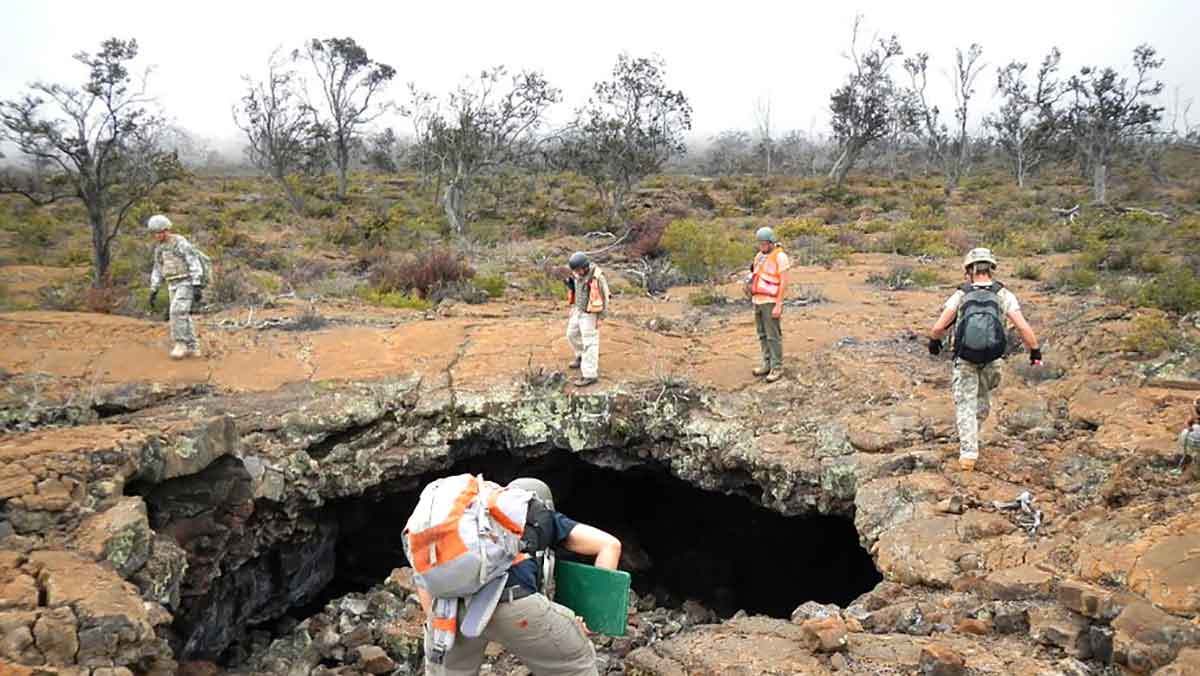


Select one of the options below:

Enroll in one of the few online certificate programs in the country of its kind to learn the breadth and complexity of military land resource management. The Graduate Certificate in Sustainable Military Lands Management (SMLM) was designed for both civilian and military land management professionals. Gain the knowledge and skills to work with the rapidly evolving practices, technologies, and analytical tools necessary to support conservation and sustainable management of natural and cultural resources on Department of Defense lands.
The demand for highly skilled and educated environmental professionals to manage military lands is rapidly increasing. Military lands are critical assets for training and testing exercises, but they also contain diverse and often rare natural and cultural resources that must be protected. Managing and sustaining these lands requires knowledge of ecological concepts and new technical and communication skills in a wide range of natural and cultural resource areas.
In this program you will:
Earning your military land management certificate online can lead to job opportunities and career advancement in a wide array of federal and state land resource management agencies. The skills and credits you earn can help you gain entry into the field, or get promoted within an agency with which you already work.
Courses for this program are delivered online and are available worldwide to anyone with access to the Internet. The online format allows you to participate in class discussions and assignments when it's convenient for your schedule. Canvas, CSU's online learning platform, provides user-friendly access to course materials, discussion groups, assignments, exams, chat, and other learner services.
Although this online certificate program offers flexibility, it still requires the same amount of work and time as an on-campus program. It is recommended to spend nine to twelve hours per week on a three credit course, on activities such as:
When you take this program's conservation and land management courses online, you can study at any time and location convenient for your schedule.
The SMLM certificate allows you to work with experts in the field and tenured professors with years of experience. Draw off current research and literature in this field of study and network with other professionals with backgrounds in this area.
This certificate is offered through a partnership with the Warner College of Natural Resources (WCNR), which is leading course development through the Center for Environmental Management of Military Lands (CEMML). As Colorado's land-grant institution, Colorado State University is recognized as a national leader in graduate education for the disciplines of natural resources, cultural resources, and environmental science.
WCNR has traditionally worked closely with federal land management agencies (e.g., U.S. Forest Service, U.S. National Park Service) in the professional development of their workforce. As part of the College, the Department of Forest, Range and Watershed Stewardship (FRWS) and the Center for Environmental Management of Military Lands house extensive applied research and management expertise in conservation and sustainability of Department of Defense (DoD) lands.
The faculty who teach in the Sustainable Military Lands Management graduate certificate program bring a wealth of knowledge to courses, with specialties ranging from watershed management and modeling to cultural resources management.

Dr. William W. Doe
Dr. William (Bill) Doe has taught a broad range of courses in physical and cultural/regional geography, water resources, land use planning, and environmental studies for the U.S. Military Academy (West Point, NY), Western Illinois University, and Penn State University. He is a former military engineer and environmental geographer with research and applied expertise in military lands management, watershed management and modeling, renewable energy, and sustainability practices for universities and federal installations.
Dr. Doe is currently employed at the University of Colorado-Boulder, in the College of Engineering and Applied Science, where he coordinates external research opportunities with federal and state agencies, and industry partners. From 2010-2014 he was the Chief Executive Officer of Veterans Green Jobs, a Denver-based non-profit providing employment for veterans in the renewable energy, energy efficiency, and natural resources conservation sectors. He also previously held positions as Associate Dean for Research in the Warner College of Natural Resources at CSU, and as a senior research scientist/scholar and Associate Director with the Center for Environmental Management of Military Lands (CEMML) at CSU.
Dr. Doe served on active duty for 22 years as an Army Corps of Engineers officer with assignments in civil works, water resources management, combat engineering and environmental R&D. While on active duty, he was on the faculty as Academy Professor and Program Director of Geography and Environmental Studies at the U.S. Military Academy, West Point.
He is an active member of the Association of American Geographers (AAG) and volunteers for veterans' organizations. He received his undergraduate degree from the U.S. Military Academy and advanced degrees from the University of New Hampshire and Colorado State University. He has published numerous articles and book chapters on military lands management, including Modern Military Geography (Routledge Press, 2010, ISBN: 978-0-415-87095-5).

Robin Rothfeder
Robin Rothfeder is an Assistant Professor of Natural Resource Policy in the Forest and Rangeland Stewardship Department at CSU. Robin's classes use social-ecological challenges and opportunities as the focal point for engaged, interactive learning experiences. His teaching in the MNRS program focuses on environmental impact analysis as governed by the National Environmental Policy Act (NEPA). His research covers two broad topics: (a) collaboration in social-ecological systems, and (b) water resource planning, policy, and management. In both areas, he takes an interdisciplinary and mixed methods approach aimed at meeting real-world community needs.
Robin has a diverse interdisciplinary background, including undergraduate degrees in Environmental Science and Environmental Economics from the University of California-Berkeley, as well as a master’s degree in Environmental Humanities and a PhD in Ecological Planning from the University of Utah.

Danny C. Reinke, PhD
Dr. Reinke has more than 20 years of NEPA experience working for private consulting firms and for DoD and other federal agencies. Currently he works at Edward AFB, CA where he is a Senior Environmental Scientist for NEPA and Natural Resources issues.
Before coming to Edwards AFB he worked for the Army National Guard at both the installation and NGB headquarters level where he developed the initial NEPA guidance for the Army National Guard. Dr. Reinke received a BS in Biology/Chemistry from Southwester Oklahoma State College (1973) and a MS in Botany (1975) and PhD in Plant Ecology (1980) from the University of Kansas.
Dr. Reinke is a member of numerous national and international environmental organizations and is the senior author of two books. “The NEPA Reference Guide” 1999 Battelle Press and “Endangered Species, Legal Requirements and Policy Guidance” 2001 Battelle Press both coauthored with Lucinda Low Swartz.

Florencia Pezzutti
Florencia Pezzutti holds a Master of Arts in Anthropology from Colorado State University (2010) and a Bachelor of Arts in Anthropology from Kent State University (2005). With over 18 years of experience, Florencia specializes in conducting archaeological work in Mexico and the U.S., with extensive fieldwork in Colorado, Oregon, Alaska, California, Hawaii, and Mexico. Throughout her career, Florencia has successfully executed and supervised a wide range of field and laboratory projects, encompassing data analysis, research design, archaeological site evaluation, report production, GIS analysis, remote sensing, and cartographic production. Florencia has contributed to numerous peer-reviewed articles in archaeology and cultural anthropology/public health, as well as reports submitted to the government of Mexico and U.S. military installations. Florencia has managed projects funded by prestigious organizations such as the National Science Foundation and the NASA Space Archaeology Program. Also, Florencia has directed projects funded by the Department of Defense (DoD) in Hawaii, Oregon, Colorado, and California, and projects funded by the USDA in Colorado. Florencia's expertise also extends to teaching, where they have taught courses on archaeology and remote sensing. Florencia currently serves as a Principal Investigator at CEMML, where they oversee multiple projects, including the incorporation of climate change considerations into Integrated Cultural Resource Management Plans (ICRMPs) for the Department of the Air Force (DAF).
Students must complete 12 credits to earn the Graduate Certificate in Sustainable Military Lands Management (SMLM). Courses are offered on a regular semester basis using a 16-week format, with one lesson offered each week. It is recommended that you begin the program by completing NR 550 first.
Note: This certificate may have courses in common with other graduate certificates. A student may earn more than one certificate, but a given course may be counted only toward one certificate.
If you plan to take any combination of NR 550, NR 551, NR 552, and NR 567, you may be interested in the Graduate Certificate in Applied Global Stability: Natural Resources.
| Fall semester | N/A* |
| Spring semester | N/A* |
| Summer semester | N/A* |
Start your application online and upload materials directly into the online system. You can save your progress and return any time.
Apply NowThe online Sustainable Military Lands Management graduate certificate requires that students have a bachelor's degree from a regionally accredited institution.
Complete the online graduate application and pay the nonrefundable application processing fee (payable online). As soon as you have completed the required information, please submit your application. Your application will not be reviewed until it is complete and all required materials have been received.
Request one official transcript from the institution where you earned your bachelor’s degree. Transcripts must be received directly from the originating institution to be considered official. Transcripts from Colorado State University are not required.
Electronic (preferred): Digital Transcripts must be submitted by the originating institution using a secure service such as parchment, eScrip-Safe, the National Student Clearinghouse, or e-Quals. Transcripts received via emails are considered unofficial. Use institution code 4075 for Colorado State University or gradadmissions@colostate.edu if the secure service requires an email address.
Mail (if necessary): Graduate Admissions Colorado State University – Office of Admissions 1062 Campus Delivery Fort Collins, CO 80523-1062
View your application status at any time to ensure your application checklist is complete or to check on updates.
Once your complete application, including supporting materials, is received, the department admission committee will review your application and notify you of their decision.
Proof of English language proficiency is required for applicants from countries or United States territories where there are official languages other than (or in addition to) English. This includes the U.S. territories of American Samoa, Guam, the Northern Mariana Islands, and Puerto Rico.